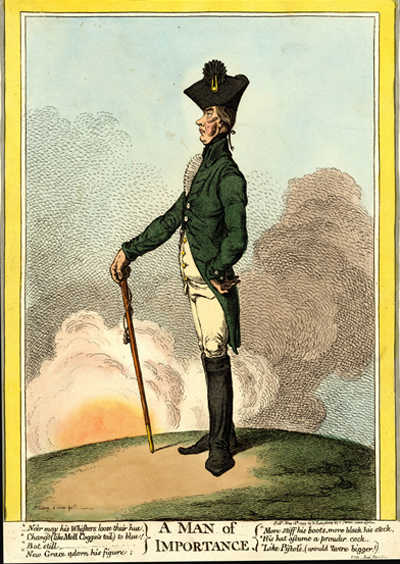A Man of Importance
This is one of three prints featuring Francis Edward Rawdon-Hastings, Earl of Moira that can all be associated with the poem, "The Ode to Lord Moira" which appeared in the Anti-Jacobin, or Weekly Examiner early in 1798. The others are Lord Longbow, the Alarmist, Discovering the Miseries of Ireland. . . and the untitled and likely unpublished print in the British Museum which appears as The Ode to Lord Moira.

© National Portrait Gallery, London
The two other prints can be broadly characterized as illustrations to the poem, and, in fact, "Lord Longbow" appeared alongside the Ode in later editions of The Poetry of the Anti-Jacobin. A Man of Importance, however, works solidly within the portrait caricature tradition, using lines from the poem solely as an allusive caption to help identify the figure portrayed.
'"Ne'er may his Whiskers loose their hue,
" Chang'd (like Moll Coggin's tail) to blue!
"But still -
"New Grace adorn his figure;
"More stiff his boots, more black his stock,
"His hat assume a prouder cock,
"Like Pistol's, (would 'twere bigger!)
In the full text of the Ode (see the link below), originally written in 1797, Moira was criticized for being a teller of tall tales, for exaggerating the misery and discontent in Ireland. But, in fact, he was correct, and the repressive governmental policy he condemned was a contributing factor in the Irish rebellion of May of 1798. The fire and smoke coming from beyond the horizon in this print is likely an allusion to that rebellion. But there were also rumors in 1797 that Moira might succeed Pitt as Prime Minister, hence the title, "A Man of Importance."
But why would this be relevant in May of 1799? There are perhaps two reasons. One is that a reprint of The Anti-Jacobin had been advertised for sale in April, 1799. So Moira's role in those events would have had renewed currency. But another, and likely more important reason, is the fact that the union of the Irish and English parliaments was then under discussion. Moira was important as a steady and moderating voice. Standing up to his own Whig party, he supported Pitt's plan for the union, seeing in it the hope of better Irish representation and long-standing improvement in Anglo-Irish relations.
Sources and Reading
- Commentary from the British Museum on A Man of Importance
- "Earl of Moira," Wikipedia
- "Irish Rebellion of 1798," Wikipedia
- "The Anti-Jacobin," Wikipedia
- Thomas Wright and R.H. Evans, Historical and Descriptive Account of the Caricatures of James Gillray #239
- Ode to Lord Moira: Complete Text
Comments & Corrections
NOTE: Comments and/or corrections are always appreciated. To make that easier, I have included a form below that you can use. I promise never to share any of the info provided without your express permission.